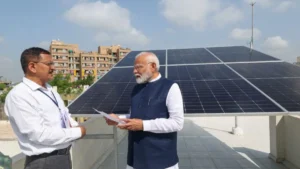The Indian government, through the Ministry of Agriculture, is gearing up to launch a groundbreaking initiative aimed at supporting small and marginal farmers who face challenges in storing their produce while waiting for optimal market conditions.
PMKisan Bhai Scheme Set to Revolutionize Agricultural Trade
- The proposed PMKisan Bhai (Bhandaran Incentive) scheme is designed to empower farmers by breaking the monopoly of traders in determining crop prices.
- With a deadline for feedback now closed, the scheme is expected to be rolled out by the end of December, signaling a potential shift in the dynamics of agricultural trade in the country.
Breaking the Monopoly
- One of the primary objectives of the PMKisan Bhai scheme is to break the traditional practice where farmers are compelled to sell their crops around the harvest period, typically spanning 2-3 months.
- The scheme aims to provide farmers with the autonomy to decide when to sell, allowing them to retain their crops for a minimum of three months post-harvest.
- This strategic shift is anticipated to challenge the existing monopoly of traders in determining crop prices, giving farmers more control over their agricultural produce.
Piloting the Initiative
- The scheme is set to undergo a pilot phase in seven states, namely Andhra Pradesh, Assam, Madhya Pradesh, Maharashtra, Rajasthan, Tamil Nadu, and Uttar Pradesh.
- With an estimated expenditure of ₹170 crore over three years, including the current fiscal year, the pilot phase aims to test the feasibility and effectiveness of the PMKisan Bhai scheme in diverse agricultural landscapes.
Components of the Proposal
- The PMKisan Bhai scheme comprises two major components – Warehousing Rental Subsidy (WRS) and Prompt Repayment Incentive (PRI).
- Small and marginal farmers, as well as farmer producer organizations (FPOs), will be eligible for the WRS benefit at ₹4 per quintal per month, regardless of the rate of warehousing charges. However, the government proposes a maximum storage incentive period of three months.
- Additionally, produce stored for 15 days or less will not qualify for the subsidy, and the incentive will be calculated on a day-to-day basis.
Addressing Constraints
- The concept paper highlights the constraints faced by farmers, such as high carryover costs and credit risks associated with the current pledge finance facility.
- To overcome these challenges, the government emphasizes the need to incentivize the storage of farmers’ produce in scientifically built warehouses.
- Furthermore, there is a proposal to reduce the interest rate on pledge finance availed against a secured instrument of eNegotiable Warehouse Receipts (eNWRs).
- It aims to accomplish this by introducing a Prompt Repayment Incentive (PRI) on trading such eNWR via the eNational Agriculture Market (eNAM) platform or other registered e-trading platforms interoperable with eNAM.
Challenges and Outlook
- While experts express optimism about the scheme’s potential to empower farmers, concerns have been raised about the influence of buyers on prices.
- A commodity market analyst notes that the success of the PMKisan Bhai scheme hinges on the response of buyers, who still wield significant influence in the agricultural value chain due to their substantial capital base.
- As the scheme progresses, its impact on market dynamics and the overall welfare of small and marginal farmers will be closely monitored.




 Delhi to Implement ‘Rah-Veer’ Scheme to ...
Delhi to Implement ‘Rah-Veer’ Scheme to ...
 2 Years of PM Surya Ghar Scheme: Rooftop...
2 Years of PM Surya Ghar Scheme: Rooftop...
 From Seva Teerth, PM Modi Announces PM R...
From Seva Teerth, PM Modi Announces PM R...








